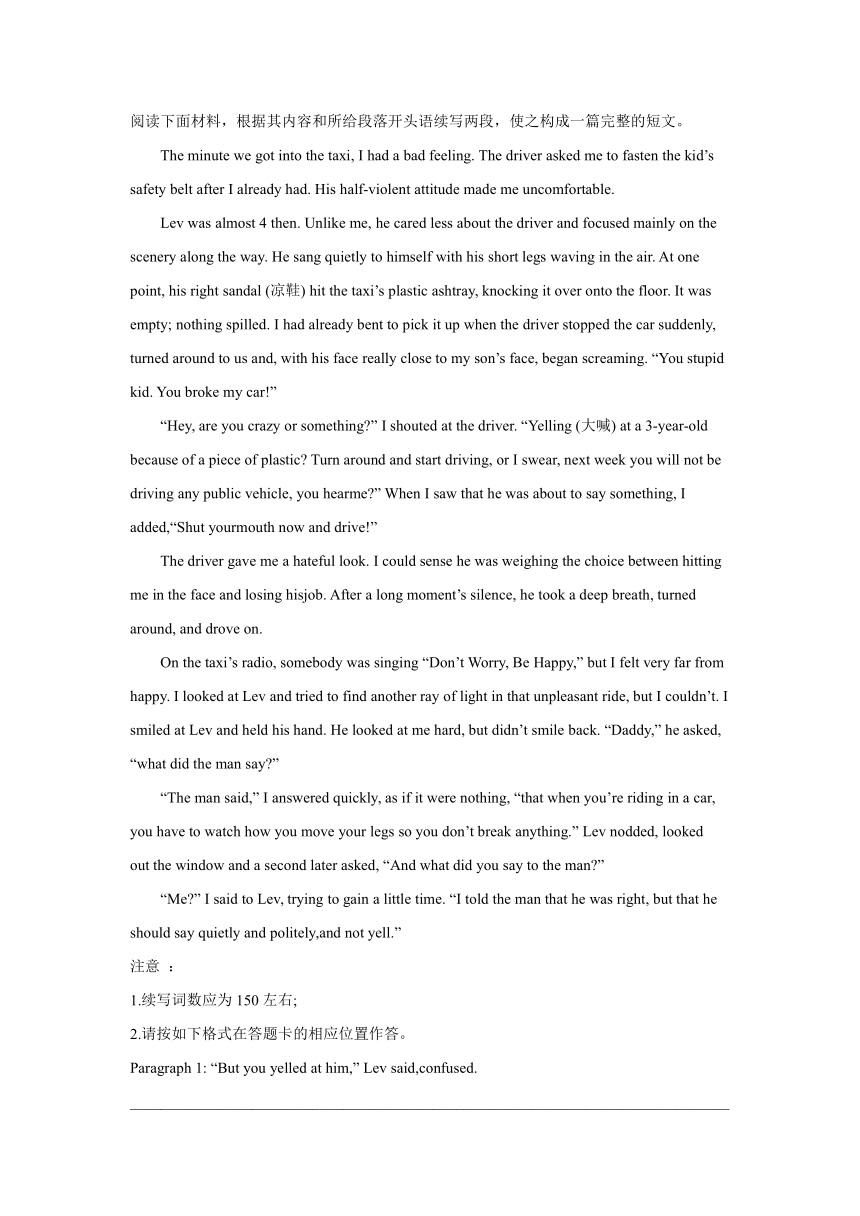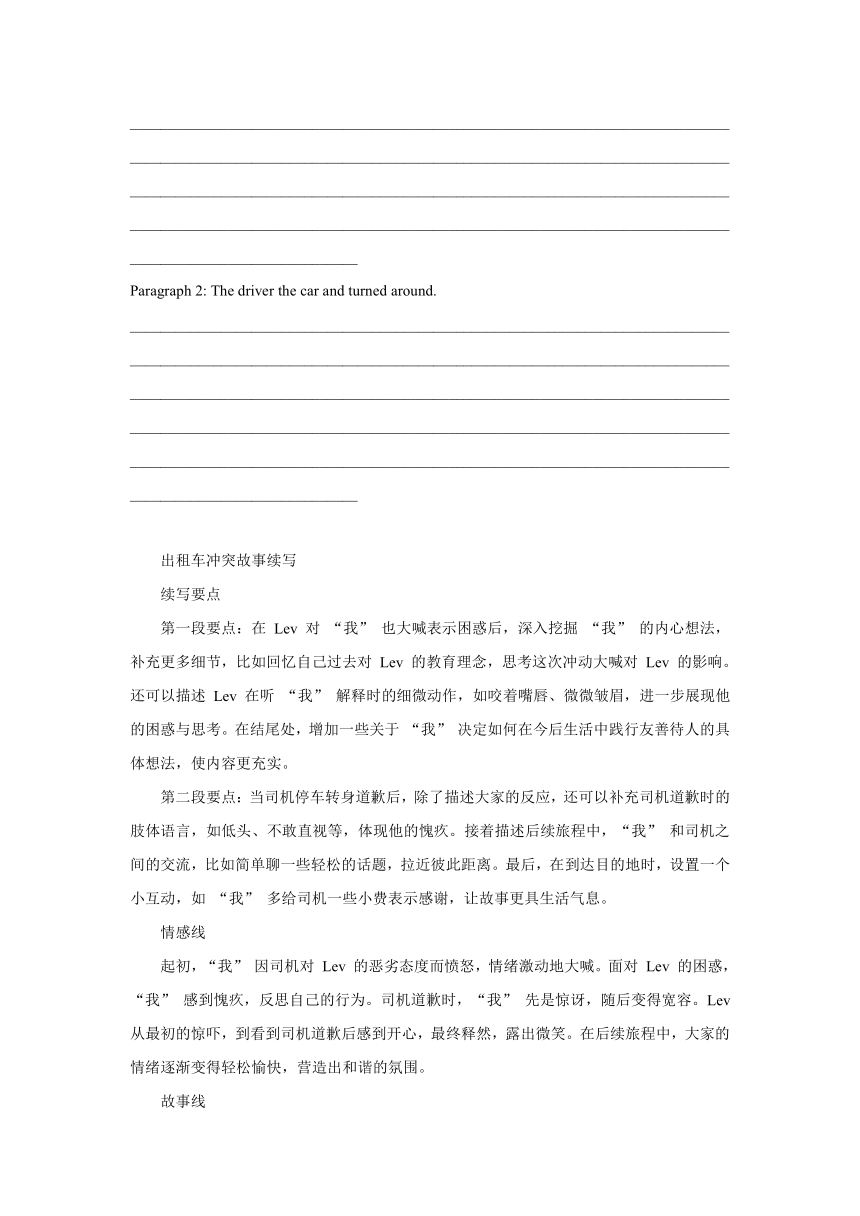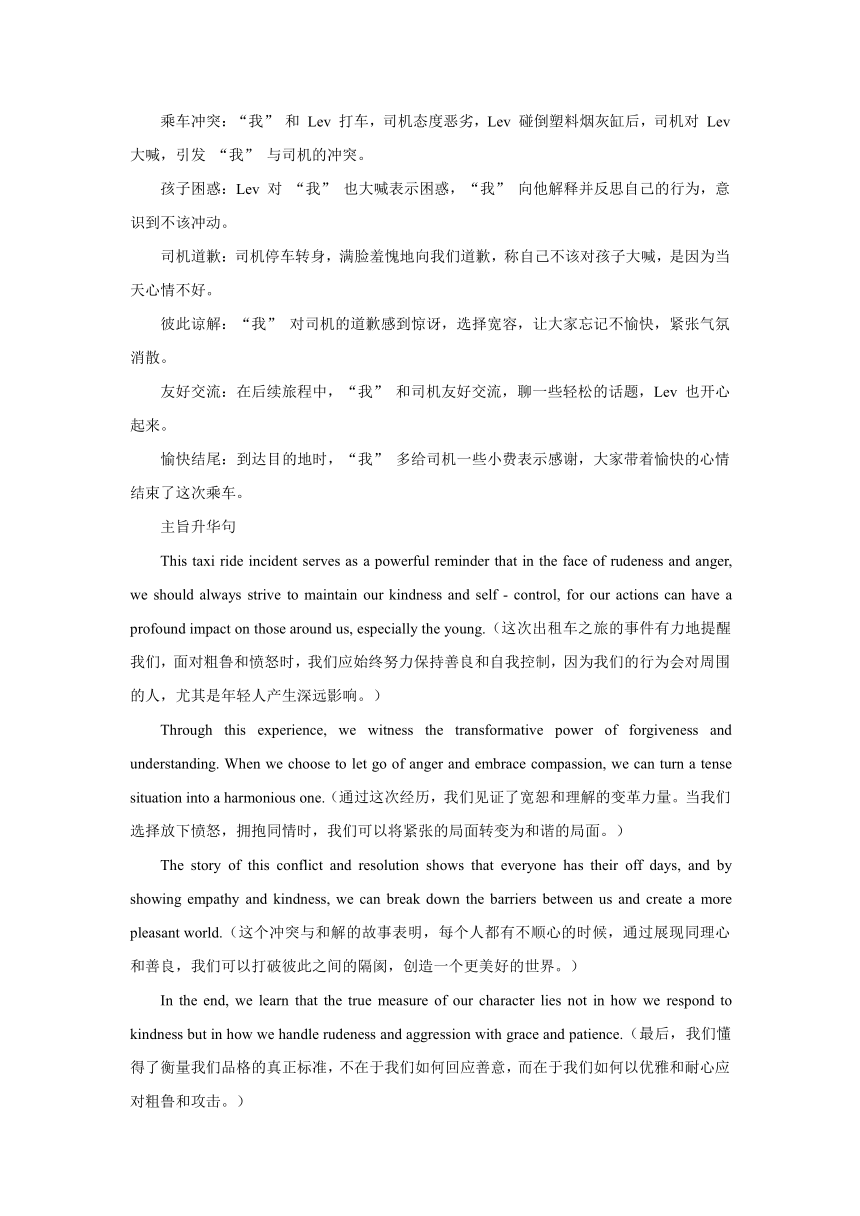故事续写:出租车冲突故事 讲义-山东省临沂市2024-2025学年高三上学期期末考试英语试题
文档属性
| 名称 | 故事续写:出租车冲突故事 讲义-山东省临沂市2024-2025学年高三上学期期末考试英语试题 |  | |
| 格式 | docx | ||
| 文件大小 | 22.5KB | ||
| 资源类型 | 教案 | ||
| 版本资源 | 人教版(2019) | ||
| 科目 | 英语 | ||
| 更新时间 | 2025-02-10 14:04:57 | ||
图片预览



文档简介
阅读下面材料,根据其内容和所给段落开头语续写两段,使之构成一篇完整的短文。
The minute we got into the taxi, I had a bad feeling. The driver asked me to fasten the kid’s safety belt after I already had. His half-violent attitude made me uncomfortable.
Lev was almost 4 then. Unlike me, he cared less about the driver and focused mainly on the scenery along the way. He sang quietly to himself with his short legs waving in the air. At one point, his right sandal (凉鞋) hit the taxi’s plastic ashtray, knocking it over onto the floor. It was empty; nothing spilled. I had already bent to pick it up when the driver stopped the car suddenly, turned around to us and, with his face really close to my son’s face, began screaming. “You stupid kid. You broke my car!”
“Hey, are you crazy or something ” I shouted at the driver. “Yelling (大喊) at a 3-year-old because of a piece of plastic Turn around and start driving, or I swear, next week you will not be driving any public vehicle, you hearme ” When I saw that he was about to say something, I added,“Shut yourmouth now and drive!”
The driver gave me a hateful look. I could sense he was weighing the choice between hitting me in the face and losing hisjob. After a long moment’s silence, he took a deep breath, turned around, and drove on.
On the taxi’s radio, somebody was singing “Don’t Worry, Be Happy,” but I felt very far from happy. I looked at Lev and tried to find another ray of light in that unpleasant ride, but I couldn’t. I smiled at Lev and held his hand. He looked at me hard, but didn’t smile back. “Daddy,” he asked, “what did the man say ”
“The man said,” I answered quickly, as if it were nothing, “that when you’re riding in a car, you have to watch how you move your legs so you don’t break anything.” Lev nodded, looked out the window and a second later asked, “And what did you say to the man ”
“Me ” I said to Lev, trying to gain a little time. “I told the man that he was right, but that he should say quietly and politely,and not yell.”
注意 :
1.续写词数应为150左右;
2.请按如下格式在答题卡的相应位置作答。
Paragraph 1: “But you yelled at him,” Lev said,confused.
_________________________________________________________________________________________________________________________________________________________________________________________________________________________________________________________________________________________________________________________________________________________________________________________________________________________________________
Paragraph 2: The driver the car and turned around.
_________________________________________________________________________________________________________________________________________________________________________________________________________________________________________________________________________________________________________________________________________________________________________________________________________________________________________
出租车冲突故事续写
续写要点
第一段要点:在 Lev 对 “我” 也大喊表示困惑后,深入挖掘 “我” 的内心想法,补充更多细节,比如回忆自己过去对 Lev 的教育理念,思考这次冲动大喊对 Lev 的影响。还可以描述 Lev 在听 “我” 解释时的细微动作,如咬着嘴唇、微微皱眉,进一步展现他的困惑与思考。在结尾处,增加一些关于 “我” 决定如何在今后生活中践行友善待人的具体想法,使内容更充实。
第二段要点:当司机停车转身道歉后,除了描述大家的反应,还可以补充司机道歉时的肢体语言,如低头、不敢直视等,体现他的愧疚。接着描述后续旅程中,“我” 和司机之间的交流,比如简单聊一些轻松的话题,拉近彼此距离。最后,在到达目的地时,设置一个小互动,如 “我” 多给司机一些小费表示感谢,让故事更具生活气息。
情感线
起初,“我” 因司机对 Lev 的恶劣态度而愤怒,情绪激动地大喊。面对 Lev 的困惑,“我” 感到愧疚,反思自己的行为。司机道歉时,“我” 先是惊讶,随后变得宽容。Lev 从最初的惊吓,到看到司机道歉后感到开心,最终释然,露出微笑。在后续旅程中,大家的情绪逐渐变得轻松愉快,营造出和谐的氛围。
故事线
乘车冲突:“我” 和 Lev 打车,司机态度恶劣,Lev 碰倒塑料烟灰缸后,司机对 Lev 大喊,引发 “我” 与司机的冲突。
孩子困惑:Lev 对 “我” 也大喊表示困惑,“我” 向他解释并反思自己的行为,意识到不该冲动。
司机道歉:司机停车转身,满脸羞愧地向我们道歉,称自己不该对孩子大喊,是因为当天心情不好。
彼此谅解:“我” 对司机的道歉感到惊讶,选择宽容,让大家忘记不愉快,紧张气氛消散。
友好交流:在后续旅程中,“我” 和司机友好交流,聊一些轻松的话题,Lev 也开心起来。
愉快结尾:到达目的地时,“我” 多给司机一些小费表示感谢,大家带着愉快的心情结束了这次乘车。
主旨升华句
This taxi ride incident serves as a powerful reminder that in the face of rudeness and anger, we should always strive to maintain our kindness and self - control, for our actions can have a profound impact on those around us, especially the young.(这次出租车之旅的事件有力地提醒我们,面对粗鲁和愤怒时,我们应始终努力保持善良和自我控制,因为我们的行为会对周围的人,尤其是年轻人产生深远影响。)
Through this experience, we witness the transformative power of forgiveness and understanding. When we choose to let go of anger and embrace compassion, we can turn a tense situation into a harmonious one.(通过这次经历,我们见证了宽恕和理解的变革力量。当我们选择放下愤怒,拥抱同情时,我们可以将紧张的局面转变为和谐的局面。)
The story of this conflict and resolution shows that everyone has their off days, and by showing empathy and kindness, we can break down the barriers between us and create a more pleasant world.(这个冲突与和解的故事表明,每个人都有不顺心的时候,通过展现同理心和善良,我们可以打破彼此之间的隔阂,创造一个更美好的世界。)
In the end, we learn that the true measure of our character lies not in how we respond to kindness but in how we handle rudeness and aggression with grace and patience.(最后,我们懂得了衡量我们品格的真正标准,不在于我们如何回应善意,而在于我们如何以优雅和耐心应对粗鲁和攻击。)
This heart - warming tale of a taxi ride teaches us that even in the most unexpected situations, a simple apology and a willingness to forgive can bring about a remarkable change and fill our hearts with warmth and hope.(这个关于出租车之旅的温馨故事告诉我们,即使在最意想不到的情况下,一个简单的道歉和愿意宽恕的态度,也能带来显著的改变,让我们的心中充满温暖和希望。)
写作示范一
第一段
“But you yelled at him,” Lev said, confused. A flush of embarrassment crept up my cheeks as I grappled with how to explain my actions. I thought back to all the times I'd told Lev to use his words kindly and handle conflicts with patience. Now, I'd failed to live up to my own teachings. “Lev, I know I made a mistake,” I said, my voice softening. “I let my anger get the better of me. You see, when people are angry, they sometimes do things they regret. I don't want you to learn from my bad example. From now on, I'll always try to be calm, no matter what happens.” Lev tilted his head, his eyes searching mine. “Okay, Daddy,” he said finally, his small voice full of trust. I pulled him closer, vowing to be a better role model.
第二段
The driver stopped the car and turned around. His shoulders were slumped, and his eyes were downcast. “I'm really sorry,” he said, his voice barely above a whisper. “I shouldn't have lost my temper like that. I had a fight with my wife this morning, and I took it out on you and the kid. I'm truly ashamed.” I was touched by his honesty. “It's alright,” I said sincerely. “We all have our troubles. Let's just start over.” The driver nodded gratefully. For the rest of the ride, we chatted about the local sports teams. When we arrived, I handed him an extra tip. “Thanks for the apology,” I said with a smile. He smiled back, and for the first time, the ride felt like a pleasant journey.
写作示范二
第一段
“But you yelled at him,” Lev said, confused. I felt a lump form in my throat as I realized the contradiction in my behavior. I sat there for a moment, collecting my thoughts. “Lev, Daddy was frustrated because that man was being unkind to you,” I explained slowly. “But yelling is never the right way to solve problems. I should have been more patient and understanding, just like I always tell you to be. Can you forgive me ” Lev's eyes widened, and then he gave me a small smile. “I forgive you, Daddy,” he said. I hugged him tightly, feeling a new determination to practice what I preached. “Next time, we'll handle it better together, okay ” I said. Lev nodded eagerly, his spirits lifted.
第二段
The driver stopped the car and turned around. His face was filled with remorse. “I owe you both a big apology,” he said. “I had no right to speak to your son like that. I was wrong, and I hope you can find it in your hearts to forgive me.” I was surprised by his sincerity. “Of course, we forgive you,” I said. “We all have bad days. Let's put this behind us.” The driver's face relaxed, and a sense of relief filled the car. As we drove on, we talked about the beautiful scenery outside. When we reached our destination, I shook the driver's hand. “Thanks for turning this around,” I said. He smiled, and we parted ways, all of us feeling lighter than before.
【答案】Paragraph 1:
“But you yelled at him,” Lev said, confused. I was at a loss for words, realizing my son was correct. Taking a deep breath, I said, “You’re right, Lev. I did exactly what I told him not to do. I should not have raised my voice, no matter how upset I was.” Lev looked at me thoughtfully and asked, “So why didn’t you talk quietly and politely like you told him to ” I hesitated for a moment and replied softly, “Because sometimes adults don’t handle anger well, and I will try to do better next time.”Lev gave a small nod, still unsure, but he seemed to accept my explanation.
Paragraph 2: The driver stopped the car and turned around. He glanced at me briefly and then turned his head to Lev, clearly still annoyed. “I overreacted earlier,” he muttered. “Sorry, kid.” Lev looked at him, his face serious, and said, “It’s okay, but next time, talk nicely. My dad says that’s better.” The driver blinked in surprise and then nodded, starting the car again without another word. I felt a sense of relief mixed with pride. Lev had reminded both the driver and me of a gentler approach to handling conflict.
The minute we got into the taxi, I had a bad feeling. The driver asked me to fasten the kid’s safety belt after I already had. His half-violent attitude made me uncomfortable.
Lev was almost 4 then. Unlike me, he cared less about the driver and focused mainly on the scenery along the way. He sang quietly to himself with his short legs waving in the air. At one point, his right sandal (凉鞋) hit the taxi’s plastic ashtray, knocking it over onto the floor. It was empty; nothing spilled. I had already bent to pick it up when the driver stopped the car suddenly, turned around to us and, with his face really close to my son’s face, began screaming. “You stupid kid. You broke my car!”
“Hey, are you crazy or something ” I shouted at the driver. “Yelling (大喊) at a 3-year-old because of a piece of plastic Turn around and start driving, or I swear, next week you will not be driving any public vehicle, you hearme ” When I saw that he was about to say something, I added,“Shut yourmouth now and drive!”
The driver gave me a hateful look. I could sense he was weighing the choice between hitting me in the face and losing hisjob. After a long moment’s silence, he took a deep breath, turned around, and drove on.
On the taxi’s radio, somebody was singing “Don’t Worry, Be Happy,” but I felt very far from happy. I looked at Lev and tried to find another ray of light in that unpleasant ride, but I couldn’t. I smiled at Lev and held his hand. He looked at me hard, but didn’t smile back. “Daddy,” he asked, “what did the man say ”
“The man said,” I answered quickly, as if it were nothing, “that when you’re riding in a car, you have to watch how you move your legs so you don’t break anything.” Lev nodded, looked out the window and a second later asked, “And what did you say to the man ”
“Me ” I said to Lev, trying to gain a little time. “I told the man that he was right, but that he should say quietly and politely,and not yell.”
注意 :
1.续写词数应为150左右;
2.请按如下格式在答题卡的相应位置作答。
Paragraph 1: “But you yelled at him,” Lev said,confused.
_________________________________________________________________________________________________________________________________________________________________________________________________________________________________________________________________________________________________________________________________________________________________________________________________________________________________________
Paragraph 2: The driver the car and turned around.
_________________________________________________________________________________________________________________________________________________________________________________________________________________________________________________________________________________________________________________________________________________________________________________________________________________________________________
出租车冲突故事续写
续写要点
第一段要点:在 Lev 对 “我” 也大喊表示困惑后,深入挖掘 “我” 的内心想法,补充更多细节,比如回忆自己过去对 Lev 的教育理念,思考这次冲动大喊对 Lev 的影响。还可以描述 Lev 在听 “我” 解释时的细微动作,如咬着嘴唇、微微皱眉,进一步展现他的困惑与思考。在结尾处,增加一些关于 “我” 决定如何在今后生活中践行友善待人的具体想法,使内容更充实。
第二段要点:当司机停车转身道歉后,除了描述大家的反应,还可以补充司机道歉时的肢体语言,如低头、不敢直视等,体现他的愧疚。接着描述后续旅程中,“我” 和司机之间的交流,比如简单聊一些轻松的话题,拉近彼此距离。最后,在到达目的地时,设置一个小互动,如 “我” 多给司机一些小费表示感谢,让故事更具生活气息。
情感线
起初,“我” 因司机对 Lev 的恶劣态度而愤怒,情绪激动地大喊。面对 Lev 的困惑,“我” 感到愧疚,反思自己的行为。司机道歉时,“我” 先是惊讶,随后变得宽容。Lev 从最初的惊吓,到看到司机道歉后感到开心,最终释然,露出微笑。在后续旅程中,大家的情绪逐渐变得轻松愉快,营造出和谐的氛围。
故事线
乘车冲突:“我” 和 Lev 打车,司机态度恶劣,Lev 碰倒塑料烟灰缸后,司机对 Lev 大喊,引发 “我” 与司机的冲突。
孩子困惑:Lev 对 “我” 也大喊表示困惑,“我” 向他解释并反思自己的行为,意识到不该冲动。
司机道歉:司机停车转身,满脸羞愧地向我们道歉,称自己不该对孩子大喊,是因为当天心情不好。
彼此谅解:“我” 对司机的道歉感到惊讶,选择宽容,让大家忘记不愉快,紧张气氛消散。
友好交流:在后续旅程中,“我” 和司机友好交流,聊一些轻松的话题,Lev 也开心起来。
愉快结尾:到达目的地时,“我” 多给司机一些小费表示感谢,大家带着愉快的心情结束了这次乘车。
主旨升华句
This taxi ride incident serves as a powerful reminder that in the face of rudeness and anger, we should always strive to maintain our kindness and self - control, for our actions can have a profound impact on those around us, especially the young.(这次出租车之旅的事件有力地提醒我们,面对粗鲁和愤怒时,我们应始终努力保持善良和自我控制,因为我们的行为会对周围的人,尤其是年轻人产生深远影响。)
Through this experience, we witness the transformative power of forgiveness and understanding. When we choose to let go of anger and embrace compassion, we can turn a tense situation into a harmonious one.(通过这次经历,我们见证了宽恕和理解的变革力量。当我们选择放下愤怒,拥抱同情时,我们可以将紧张的局面转变为和谐的局面。)
The story of this conflict and resolution shows that everyone has their off days, and by showing empathy and kindness, we can break down the barriers between us and create a more pleasant world.(这个冲突与和解的故事表明,每个人都有不顺心的时候,通过展现同理心和善良,我们可以打破彼此之间的隔阂,创造一个更美好的世界。)
In the end, we learn that the true measure of our character lies not in how we respond to kindness but in how we handle rudeness and aggression with grace and patience.(最后,我们懂得了衡量我们品格的真正标准,不在于我们如何回应善意,而在于我们如何以优雅和耐心应对粗鲁和攻击。)
This heart - warming tale of a taxi ride teaches us that even in the most unexpected situations, a simple apology and a willingness to forgive can bring about a remarkable change and fill our hearts with warmth and hope.(这个关于出租车之旅的温馨故事告诉我们,即使在最意想不到的情况下,一个简单的道歉和愿意宽恕的态度,也能带来显著的改变,让我们的心中充满温暖和希望。)
写作示范一
第一段
“But you yelled at him,” Lev said, confused. A flush of embarrassment crept up my cheeks as I grappled with how to explain my actions. I thought back to all the times I'd told Lev to use his words kindly and handle conflicts with patience. Now, I'd failed to live up to my own teachings. “Lev, I know I made a mistake,” I said, my voice softening. “I let my anger get the better of me. You see, when people are angry, they sometimes do things they regret. I don't want you to learn from my bad example. From now on, I'll always try to be calm, no matter what happens.” Lev tilted his head, his eyes searching mine. “Okay, Daddy,” he said finally, his small voice full of trust. I pulled him closer, vowing to be a better role model.
第二段
The driver stopped the car and turned around. His shoulders were slumped, and his eyes were downcast. “I'm really sorry,” he said, his voice barely above a whisper. “I shouldn't have lost my temper like that. I had a fight with my wife this morning, and I took it out on you and the kid. I'm truly ashamed.” I was touched by his honesty. “It's alright,” I said sincerely. “We all have our troubles. Let's just start over.” The driver nodded gratefully. For the rest of the ride, we chatted about the local sports teams. When we arrived, I handed him an extra tip. “Thanks for the apology,” I said with a smile. He smiled back, and for the first time, the ride felt like a pleasant journey.
写作示范二
第一段
“But you yelled at him,” Lev said, confused. I felt a lump form in my throat as I realized the contradiction in my behavior. I sat there for a moment, collecting my thoughts. “Lev, Daddy was frustrated because that man was being unkind to you,” I explained slowly. “But yelling is never the right way to solve problems. I should have been more patient and understanding, just like I always tell you to be. Can you forgive me ” Lev's eyes widened, and then he gave me a small smile. “I forgive you, Daddy,” he said. I hugged him tightly, feeling a new determination to practice what I preached. “Next time, we'll handle it better together, okay ” I said. Lev nodded eagerly, his spirits lifted.
第二段
The driver stopped the car and turned around. His face was filled with remorse. “I owe you both a big apology,” he said. “I had no right to speak to your son like that. I was wrong, and I hope you can find it in your hearts to forgive me.” I was surprised by his sincerity. “Of course, we forgive you,” I said. “We all have bad days. Let's put this behind us.” The driver's face relaxed, and a sense of relief filled the car. As we drove on, we talked about the beautiful scenery outside. When we reached our destination, I shook the driver's hand. “Thanks for turning this around,” I said. He smiled, and we parted ways, all of us feeling lighter than before.
【答案】Paragraph 1:
“But you yelled at him,” Lev said, confused. I was at a loss for words, realizing my son was correct. Taking a deep breath, I said, “You’re right, Lev. I did exactly what I told him not to do. I should not have raised my voice, no matter how upset I was.” Lev looked at me thoughtfully and asked, “So why didn’t you talk quietly and politely like you told him to ” I hesitated for a moment and replied softly, “Because sometimes adults don’t handle anger well, and I will try to do better next time.”Lev gave a small nod, still unsure, but he seemed to accept my explanation.
Paragraph 2: The driver stopped the car and turned around. He glanced at me briefly and then turned his head to Lev, clearly still annoyed. “I overreacted earlier,” he muttered. “Sorry, kid.” Lev looked at him, his face serious, and said, “It’s okay, but next time, talk nicely. My dad says that’s better.” The driver blinked in surprise and then nodded, starting the car again without another word. I felt a sense of relief mixed with pride. Lev had reminded both the driver and me of a gentler approach to handling conflict.
同课章节目录
